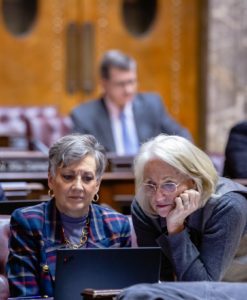February 28, 2020
Hello Friends and Neighbors,
The Tiffany Hill Act received a very warm reception at its first stop in the House of Representatives, but there is now concern that the bill may hit a roadblock. Please read on for the details and how you can help.
This legislative session is scheduled to end Thursday after next (March 12), and once again the voting deadlines are coming up quickly. Today was the last day for House-approved bills to advance from Senate policy committees; Monday is the “cutoff” for our budget committees to take action on House legislation, so I expect to be working most all day tomorrow in the Ways and Means committee.
Starting Tuesday, we’ll spend four long days in the Senate chamber voting on House bills that made it through the Senate committees. Beyond that, there are budgets to approve, and disagreements between the two chambers to settle (or attempt to settle — it doesn’t always work). There’s every reason to expect we will then adjourn on schedule.
Trouble for the Tiffany Hill Act?
I’m trying not to be too much of an alarmist about this, but the Tiffany Hill Act may be in trouble in the House. There was an amazing show of support for the bill when it came before the House Public Safety Committee a little more than a week ago — a hearing and a vote in the same morning. From there I hoped Senate Bill 5149 would go straight to the House Rules Committee, which chooses bills for the House voting calendar. However, for reasons that are not clear, the Department of Social and Health Services wildly inflated the initial cost of implementing the bill, which meant a detour to the House Appropriations Committee (that’s the operating-budget committee).
The chair of the Appropriations Committee killed the bill in 2018, long before Tiffany Hill’s tragic death made the benefits of this legislation crystal clear. Apparently he kept the Tiffany Hill Act bottled up in his committee all this past week, and I’m worried that the bill will die again unless the committee has a public hearing on the bill AND votes it forward no later than Monday.
All of us who know Tiffany’s tragic story — how she was fatally shot by her estranged husband in front of her three children in November at their Vancouver school, despite having a restraining order against him — believe she would still be alive if the real-time victim-notification technology supported by SB 5149 had already been available.
Several people have already sent emails to the Appropriations committee chair in support of the bill. For example, a sheriff’s deputy who responded to the shooting wrote this: “No children should have to witness their father murder their mother and see their grandmother being shot as she was trying to stop the bullets with her hands. We can’t fix the past but we can help prevent events like this in the future. Help us with the right tools.”
A police officer who knew Tiffany wrote this:
“Domestic Violence should be taken seriously as its existence represents a threat not only to the victim, but to the public. Several mass shootings within the United States have been directly related to Domestic Violence. Many innocent and uninvolved people have been murdered simply because they worked or went to church with a victim of Domestic Violence.
“By passing this bill you are not only protecting victims of Domestic Violence, but the general public including your own families. An abuser who has decided he has nothing to lose and is willing to kill represents a grave threat to everyone in the community.
“In addition, the passing of this bill will show the public and especially victims of Domestic Violence that their legislators care about them and are willing to take action to protect their safety.
“Tiffany’s case is unfortunately not unique. Being murdered by an intimate partner is the seventh leading cause of death for American women.”
If you want to help, send an email to the House Appropriations chairman — Rep. Timm Ormsby, whose address is Timm.Ormsby@leg.wa.gov — and urge him to make sure Senate Bill 5149 receives a “do pass” recommendation from his committee no later than Monday (March 2). There’s no reason to keep this important legislation from becoming law!
Unfortunately, Senate budget puts government first
The budget that pays for state agency operations is always one of the most important bills of a session. The full 2-year budget was adopted in April 2019, but we reopen it in the second year to make necessary adjustments (compensating for changing school enrollments is a typical adjustment).
The budget writers wait for the first quarterly revenue forecast of the year and use those fresh numbers to put the finishing touches on their plans. The first 2020 forecast came out February 19, and it put state government’s finances a whopping $1.5 BILLION ahead of where they were when the 2019 session ended. If there ever was a time for the Legislature to provide tax relief to the people, it is now.

It’s amazing to consider that since Governor Inslee took office in 2013, the rate of state spending has grown at twice the rate of wages. Notice how the spending line really starts to climb in 2018, when Democrats regained full control of the Legislature.
When the Senate majority released its budget adjustments (as a “supplemental” budget) on Monday, I was disappointed to see that it has a different plan for all that money. I was very pleased to see the tax exemption for feminine-hygiene products (my SB 5147) supported in the budget, which meant my work paid off. However, that $13.6 million tax reduction (over 4 years) is the largest single example of tax relief in the budget. In all, the supplemental operating budget proposal didn’t include much more than $60 million in tax relief, scattered among seven areas (including SB 5147). If that sounds like a lot of money, remember the budget is $53 billion and counting, so $60 million represents only about 1/10th of 1% — like getting a 10-cent rebate back after spending $100.
This means no $30 car tabs, no property-tax relief, nothing that our side would have looked to deliver if we’d been in charge of the budget. We tried to make the majority’s plan a little friendlier to the people before the final vote in the Senate chamber yesterday, but most of our proposed amendments were turned down. Increase reimbursements to skilled-nursing facilities so they stop closing? No. Make it possible for future excess revenue to go toward property tax relief? No. More support for Medicaid clients with dementia who need specialized care? No. Keep fees for newborn screening from going up unless new tests are added to the screening? No. Eliminate the Discover Pass and make state parks free again? No.
Heck, I couldn’t even get support for a simple amendment to delay a building-code change; if passed it would keep home construction costs from going up and help make housing more affordable. There’s more, but you get the idea – it’s government first, people second. The Senate budget is better than the House budget, but that’s not saying much, and I couldn’t support it.
Wilson bills still on the move
As I explained in my previous report, the lawmaking process in our state is designed to take a large number of proposals and narrow the list through a series of steps. Senate Bill 6402, my bill to increase the penalty for stealing a gun, didn’t survive the narrowing process; it reached the Senate voting calendar but never was brought up for a vote. Same for SB 6464, which would allow legislators appointed to the State Building Code Council to cast votes.

I was glad to welcome members of the Building Industry Association of Clark County who came to Olympia this week to advocate for home building and housing affordability issues.
SB 6408, to help Washington employers keep clear of regulatory issues by improving how they interface with state-government agencies, is faring much better. It won unanimous support from the Senate and another unanimous endorsement just yesterday from the House committee on state government. I ran for the Legislature intending to help improve our state’s business climate, so I’m delighted that this bill is still alive.
Counting the Tiffany Hill Act and the inclusion of the SB 5147 tax reduction in the Senate budget, as well as funding related to my Mental Health for Heroes legislation (SB 5428 — it didn’t pass but the policy was included in the budget adopted in 2019) it’s been a productive session so far.
No premature voting for felons
I’ve never seen a bill crash and burn like the felon-voting bill did last week.
The Senate and House of Representatives had until 5 p.m. February 19 to vote for their own bills and send them across the Rotunda to the other chamber. As we got within 45 minutes of the voting deadline, the majority side rejected an chance to fast-track the legislation to enact $30 car tabs. Then it said no to an opportunity to help slow the wave of nursing-facility closures across our state. Why? So it could bring up the felon-voting bill before the deadline. SB 6228 would allow felons in our state to have their voting rights restored as soon as they’re released from confinement. It wouldn’t matter if they had yet to fulfill any restitution requirements or finish out their community-custody obligations, as state law now requires them to do, even though financial costs and community supervision are commonly part of a sentence for a felony conviction.
I found it disturbing that the Senate committee on elections arranged for a convicted murderer to testify on the subject from prison in Grays Harbor County, and invited a convicted child rapist to testify at the Capitol in support of the bill this past month. Those facts were mentioned during the debate, as we offered amendments to make this terrible bill a little less terrible. An amendment to exclude child rapists from the relaxed restrictions was adopted, but then the majority balked at another amendment to exclude anyone with a “serious violent offense.” A fellow Republican senator captured the hypocrisy perfectly in a speech on the Senate floor: people convicted of raping children would have to completely fulfill their sentences before having their voting rights restored, he asked, but people convicted of shooting or killing children wouldn’t have to?
That’s when the majority apparently realized its position had become morally indefensible, and called for the Senate to adjourn without taking a final vote on SB 6228.
According to a news report on the bill’s failure, an estimated 10,000 people who are on community supervision at any given time in our state could have been affected by this proposal. I don’t see anything wrong with the law as it currently stands, but the Democrat from Bellevue who keeps introducing the bill says she’ll do it again next year.
I welcome your questions about state government and the decisions I make in the state Senate. If you expect to be in Olympia before March 12 (the session’s final scheduled day) and want to stop in, please call or e-mail!
Yours in service,











